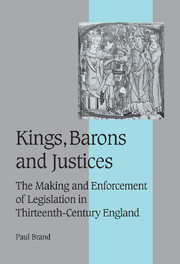Book contents
- Frontmatter
- Contents
- List of tables
- Preface
- List of abbreviations
- INTRODUCTION
- Part I Politics and the legislative reform of the common law: from the Provisions of Westminster of 1259 to the Statute of Marlborough of 1267
- Chapter 1 THE MAKING OF THE PROVISIONS OF WESTMINSTER: THE PROCESS OF DRAFTING AND THEIR POLITICAL CONTEXT
- Chapter 2 THE MAKING OF THE PROVISIONS OF WESTMINSTER: THE SOCIAL AND LEGAL CONTEXT AND THE EVOLUTION OF THE INDIVIDUAL CLAUSES: I
- Chapter 3 THE MAKING OF THE PROVISIONS OF WESTMINSTER: THE SOCIAL AND LEGAL CONTEXT AND THE EVOLUTION OF THE INDIVIDUAL CLAUSES: II
- Chapter 4 THE ENFORCEMENT OF THE PROVISIONS OF WESTMINSTER DURING THE INITIAL STAGE OF THEIR EXISTENCE, 1259–63
- Chapter 5 THE REVISION AND REISSUING OF THE PROVISIONS, 1263–4
- Chapter 6 THE REVISED PROVISIONS IN ACTION, 1263–7
- Chapter 7 THE FINAL REVISION AND REISSUE OF THE PROVISIONS OF WESTMINSTER: THE STATUTE OF MARLBOROUGH OF 1267
- Part II Beyond politics: the enforcement and interpretation of the Statute of Marlborough in the courts, 1267–1307
- Chapter 16 CONCLUSIONS
- Appendix I TEXT AND TRANSLATION OF THE PROVISIONS OF WESTMINSTER OF 1259
- Appendix II TEXT AND TRANSLATION OF THE PROVISIONS OF WESTMINSTER AS REISSUED IN 1263 AND 1264
- Appendix III TEXT AND TRANSLATION OF THE STATUTE OF MARLBOROUGH OF 1267
- Bibliography
- Index
- Cambridge Studies in Medieval Life and Thought Fourth series
Chapter 4 - THE ENFORCEMENT OF THE PROVISIONS OF WESTMINSTER DURING THE INITIAL STAGE OF THEIR EXISTENCE, 1259–63
Published online by Cambridge University Press: 16 June 2009
- Frontmatter
- Contents
- List of tables
- Preface
- List of abbreviations
- INTRODUCTION
- Part I Politics and the legislative reform of the common law: from the Provisions of Westminster of 1259 to the Statute of Marlborough of 1267
- Chapter 1 THE MAKING OF THE PROVISIONS OF WESTMINSTER: THE PROCESS OF DRAFTING AND THEIR POLITICAL CONTEXT
- Chapter 2 THE MAKING OF THE PROVISIONS OF WESTMINSTER: THE SOCIAL AND LEGAL CONTEXT AND THE EVOLUTION OF THE INDIVIDUAL CLAUSES: I
- Chapter 3 THE MAKING OF THE PROVISIONS OF WESTMINSTER: THE SOCIAL AND LEGAL CONTEXT AND THE EVOLUTION OF THE INDIVIDUAL CLAUSES: II
- Chapter 4 THE ENFORCEMENT OF THE PROVISIONS OF WESTMINSTER DURING THE INITIAL STAGE OF THEIR EXISTENCE, 1259–63
- Chapter 5 THE REVISION AND REISSUING OF THE PROVISIONS, 1263–4
- Chapter 6 THE REVISED PROVISIONS IN ACTION, 1263–7
- Chapter 7 THE FINAL REVISION AND REISSUE OF THE PROVISIONS OF WESTMINSTER: THE STATUTE OF MARLBOROUGH OF 1267
- Part II Beyond politics: the enforcement and interpretation of the Statute of Marlborough in the courts, 1267–1307
- Chapter 16 CONCLUSIONS
- Appendix I TEXT AND TRANSLATION OF THE PROVISIONS OF WESTMINSTER OF 1259
- Appendix II TEXT AND TRANSLATION OF THE PROVISIONS OF WESTMINSTER AS REISSUED IN 1263 AND 1264
- Appendix III TEXT AND TRANSLATION OF THE STATUTE OF MARLBOROUGH OF 1267
- Bibliography
- Index
- Cambridge Studies in Medieval Life and Thought Fourth series
Summary
The Michaelmas parliament of 1259 was the highwater mark of the reform movement. The following year saw the gradual abandonment of a number of key elements in the reformers' programme: the prorogation (in June) and subsequently (in the autumn) the abandonment of the special eyre for the remedying of grievances and the substitution of an ordinary general eyre with no special additional powers; the transfer to the magnates themselves of the primary responsibility for investigating and remedying the wrongdoing of their bailiffs; and the abandonment (also in the autumn) of the principle of retaining sheriffs in office only for a single year. In the final months of 1260 the baronial council itself effectively ceased to function. It was not, however, until June 1261 that Henry III published, and then only to a restricted audience, the papal bull granting him absolution from his oath of May 1258 to observe the ordinances of the reformers and also moved more publicly to appoint his own candidates to the posts of justiciar (Philip Basset) and chancellor (Walter of Merton). It was only in July 1261 that he went on to remove the sheriffs appointed by the baronial council and appoint his own candidates to local shrievalties. This last move met with considerable local resistance. Rival ‘keepers of counties’ also attempted to exercise the functions of local sheriff in many counties.
- Type
- Chapter
- Information
- Kings, Barons and JusticesThe Making and Enforcement of Legislation in Thirteenth-Century England, pp. 106 - 139Publisher: Cambridge University PressPrint publication year: 2003



